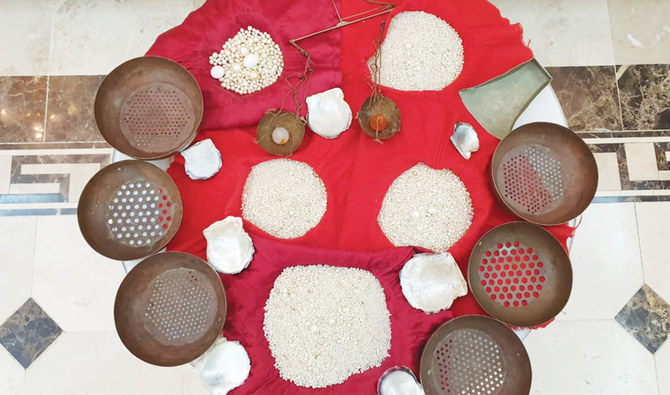MAKKAH: The men of the Farasan Islands, in the Red Sea, used to roam the seas in search of pearls. They would dive down more than 30 meters, holding their breath for more than five minutes to find the pieces of treasure that could fetch up to SR150,000 ($40,000) each.
For generations, pearling was a booming industry for residents in the Eastern region of the Arabian Peninsula — many historians believe it goes back at least four centuries. Traders from as far as India would travel to the Arabian Gulf in search for the most pure of pearls.
While the pearl industry of the Eastern Province is well known, the Kingdom’s newfound approach to rediscovering its heritage and reviving its traditions is shedding new light on the Farasan pearl divers.
For generations, the families of the islands off the southwest Saudi coast would bid farewell to their menfolk as they set sail for months on end in search of pearls.
The pearl industry shaped their identity, but today their trade is dying out. The once community-wide endeavor, from pearling merchants and divers to dhow captains, boat builders timber merchants, is becoming a thing of the past.
Specialist Suleiman Balaous said that the Qur’an mentions that dwellers of paradise will be adorned with pearls. He explained that Farasan was once a major source of pearls in the region.
“The only one way to polish natural pearls or restore their shine is to collect rainwater in a large dish and wash them in it,” he said. “The pearls will then regain their original luster and shine in a very beautiful way.”
Pearls form when a mollusk reacts to the presence of an irritant or invader inside the shell. It forms a sac around the foreign substance to cover it, which, over time, becomes a pearl.
FASTFACTS
• Pearls form when a mollusk reacts to the presence of an irritant or invader inside the shell.
• It forms a sac around the foreign substance to cover it, which, later, becomes a pearl.
• The only one way to polish natural pearls or restore their shine is to collect rainwater in a large dish and wash them in it.
The pearls all have different names, according to their size. The smallest, which are a little bigger than a grain of sand, are called “Dakkah,” the slightly larger ones are called “Ansar,” followed by “Al-Mazouri” and “Al-Tala.” The largest pearls are called “Danas.” Danas can fetch from SR1,000 up to SR150,000.
Mohammed Hadi, one of Farasan’s pearl merchants, told Arab News that in ancient times pearl hunting began when divers were looking for oysters — “bulbul,” as they are known locally.
In keeping with traditional way of determining the pearl quality, Hadi uses copper sieves to separate out the large, medium and small pearls, and has weights made of a gemstone, Yemeni agate, to determine the pearl’s weight.
Ibrahim Moftah, a writer specializing in pearls, said that the importance of pearl hunting in the Farasan community came from the fact that a diver’s manhood was measured by his proficiency.
Lacking oxygen tanks and the modern diving tools and facing sea predators, it was a far more arduous profession. Diving down to oysters beds, only the strongest and most proficient divers would dive without the use of nose clips, a perilous endeavor.
He said: “The merchants did not sell their gems in neighboring countries. Their markets were in the East, such as India. In addition to the material profits they gained, they brought home the influences of the eastern civilizations. That was reflected in the architectural styles they adopted at home, the effects of which can still be seen today in Al-Rifai House and the Najdi Mosque, as well as in the materials used in the women’s clothing, which were embroidered with silk and reed.”
He added that these merchants brought materials that were new to the region at that time, such as precious woods, Japanese tiles, paintings inlaid with ivory.
Over time, the trade of cultivated, cheaper and flawless pearls manufactured by countries such as Japan caused the pearl industry to die out in both the Eastern Province, where the oil industry became the Kingdom’s booming industry, and in the west, as younger generations turned to more traditional jobs and left the family business behind.
Pearl diving is still considered one of the Kingdom’s most treasured traditions, one that contributed to the Gulf’s transregional connections that brought wealth over the generations.
Though the perfect pearl may never be found the wonder of its creation remains one of the most intriguing of traditions in today’s modern age.


























